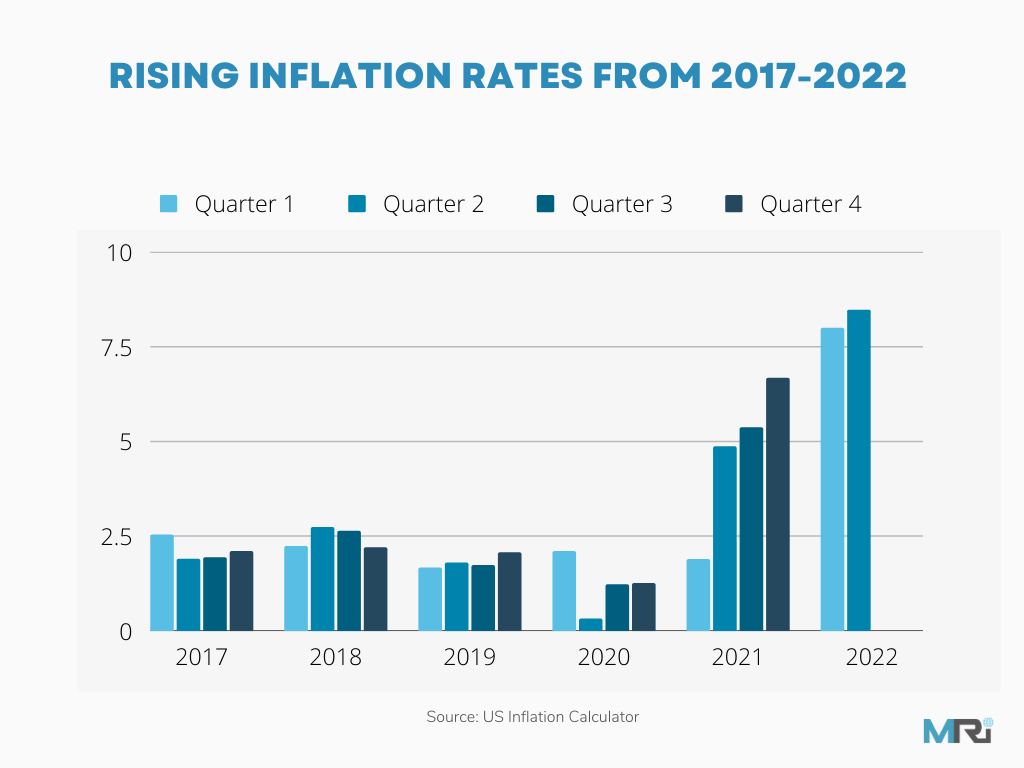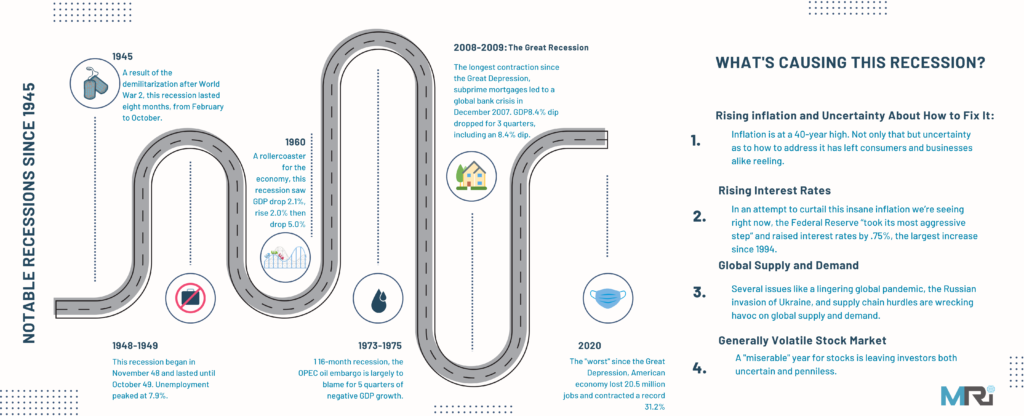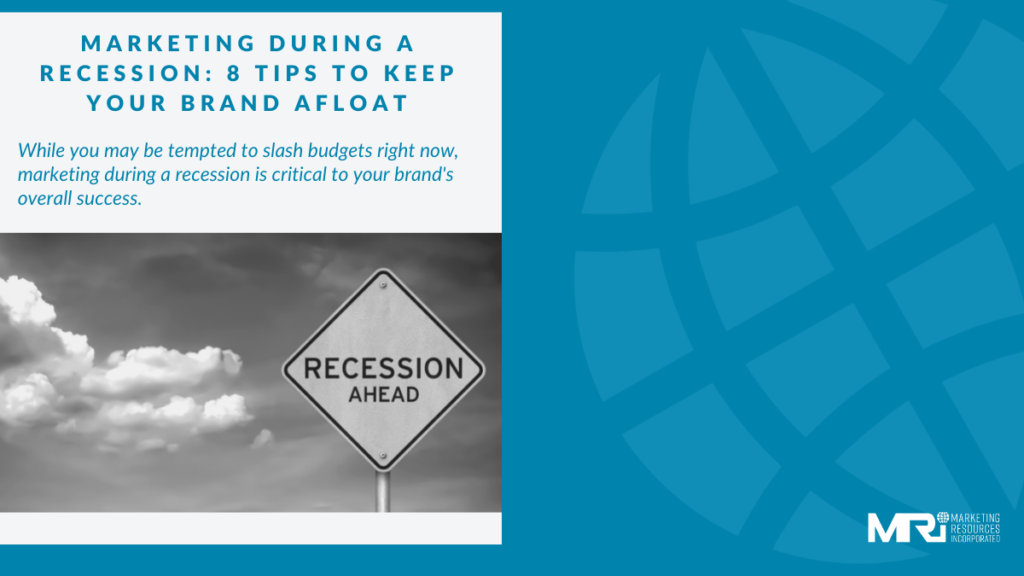Soaring gas prices, rising inflation, global conflict, and generally volatile markets are all brewing at the same time right now. Unfortunately, this isn’t a recipe most of us are eager to try, and economic uncertainty is impacting nearly every aspect of our lives now. Marketing during a recession likelyfinds itself last on your list of priorities. However, we argue that doing just that is your brand’s key to not only surviving economic uncertainty, but perhaps even gaining market share.
If you’re feeling a little uneasy (or even if you’re feeling very uneasy), you’re not alone. But, consider the following before panicking too much:
- Recessions are normal and probably more frequent than you think. Since 1945, the U.S has experienced 11 official recessions. We’ve gotten through them before, and we’ll get through this one.
- According to the country’s leading economists, the reality is that we are at an “uncomfortably high” risk of experiencing a recession in the next 12 months. The good news is that those same economists expect this recession to be “mild and brief.” What’s more, “uncomfortably high” is only a 35% chance.
While it may be tempting to immediately slash your marketing budget in order to cut costs and survive a recession, resist this urge. Instead, your brand must stay agile and be ready to adapt to the changing economy in order to come out stronger.
What Is a Recession, and Why are We About to Enter One?
Chances are, you’ve probably lived through at least three American recessions. Likely more, depending on how much life experience you’ve got (no judgment here).
2001, 2008-2009, and even 2020 have all been classified as “recessions.” Commonly defined as a shrinking of the economy for two consecutive quarters, a “recession” isn’t necessarily a reason to sound the alarms and slam on the brakes.
So, why are we likely going to enter a recession sometime this year? As mentioned above, a few reasons. We’ll give you the rundown.
- Rising inflation and Uncertainty About How to Fix It: Simply put, inflation is a normal part of any functioning economy. There are going to be ebbs and flows. But, this time, policymakers don’t know what to do. Usually, they tend to ignore inflation and fluctuations in either supply or demand, opting instead for them to “sort themselves out.” Unfortunately, though, the global economy has just been flipped upside down in the last two years. Not only that, but inflation is at a 40-year high. We can’t let this “sort itself out,” and have been trying to adapt.
- Rising Interest Rates: In an attempt to curtail this insane inflation we’re seeing right now, the Federal Reserve “took its most aggressive step” and raised interest rates by .75%, the largest increase since 1994. Of course, higher interest rates create more of a burden on consumers and businesses. Further interest rate increases are expected over the next few months, creating even more uncertainty amongst consumers.
- Global Supply and Demand: Among other things, Russia’s invasion of Ukraine has unquestionably disrupted the global economy. The supply of oil alone has a tremendous impact on nearly every industry. Chinese factories have also shut down, and American ports have been overcrowded for months, all detrimentally affecting our supply chain. Less supply of products leads to higher demand and subsequent higher prices for consumers.
- Generally Volatile Stock Market: The last few months have seen some dramatic shifts in the stock market. Everything considered, it’s no surprise. NPR reports this has been a “miserable” year for the stock market, with more volatility expected.

It’s important to note that there is no one “right” prediction for what will happen in the next year or so. In fact, economists from all over the country and even the world vary wildly in their assumptions of what will happen next.
All we can do is look to previous recessions and economic downturns, and prepare ourselves as best as we can. While every recession is unique, examining our past and bracing for the future can help us stay above water during the next economic downturn.
Consumer Behavior During a Recession
How do consumers change their behavior during a recession? It depends.
In general, consumers across the board set stricter priorities for what they consider to be “essential,” “nice-to-have,” and “able to do without.” They’ll also, in general, try to find “more valuable” alternatives to some of their products or services.
Here, “valuable” doesn’t necessarily mean “cheaper.” Rather, it might mean getting larger quantities of a product or even spending more upfront for a more durable alternative. It might even look like swapping out disposable products for reusable ones and opting for DIY versions of products they’d usually buy, like laundry detergent or dishwashing powder.
Most economists agree that in order for a consumer to purchase something (besides essentials) they must first of course have the disposable income to afford it. Then, consumers must also feel confident enough in the economy to spend that money. If they’re worried that the floor may fall from underneath them, they’re not going to make any extra purchases but rather save as much money as they can.
Specifically, previous recessions as far back as 1945 show us that expenses like dining out, arts and entertainment, clothing, cars, and consumer electronics see the largest shifts. Throughout history, consumers repeatedly scale back their spending in these particular categories the most.
Of course, outliers always exist. Some consumers, for whatever reason, won’t change their spending habits at all. Those who have plenty of disposable income won’t tighten up their spending much if at all. On the other hand, some consumers abide by a more “live for today” attitude when determining their spending habits. They’re more likely to rent as opposed to own property, spend on travel and entertainment, and value experiences.
While you plan your brand’s strategy to market through this recession, consider how your particular consumers may change their behavior. To do so, think about why they’re drawn to your brand in the first place. What needs do your products fulfill? Where does your brand
8 Tips for Marketing During a Recession
As an award-winning marketing agency for over 25 years now, we’ve seen our way through recessions in the past. We’ve examined our recession playbooks over the years, looked at what other companies have done, and read the latest opinions from the nation’s most respected economists. As a result, we’ve compiled what we believe to be the 7 best tips to help your brand market through a recession.
1. Take a Deep Breath. Don’t Do Anything Rash
Economic uncertainty can be frightening. We understand. Your knee-jerk reaction is likely to cut spending wherever you possibly can. In many cases, that means cutting your marketing budget.
Before you do that, keep a few things in mind:
- Recessions come and go. All storms come to an end and this impending recession will be no different.
- According to research from the New York Times, most leading global economists from financial establishments like JP Morgan, S&P Global Ratings, and Deloitte predict that if we do encounter a recession within the next 12 months, it will likely be “mild and brief.”
- Some of those same economists predict we have as low as a 10-15% chance of entering a recession, with some assuming as high as 40%. Either way, there is a chance that we won’t reach a technical recession at all in the next year.
Similarly, panic tends to lead to poor decision-making skills. In your personal life and your business life, panic leads to over-correcting and oftentimes creates the very problem you were hoping to avoid.
Understanding that this is certainly easier said than done, do your best to keep a clear head during uncertain times.
Senior Vice President of Client Services, Tim Hobbs, recalls that in 2008 and 2009 “many brands initially halted their marketing spend. Programs were stopped, and then budgets cuts came. Within about two months though, we saw clients return to their previous programs and marketing spend.” Our own experience marketing during a recession suggests that slamming on the brakes may not be the most prudent call.
2. Conduct New Market Research for Efficient Marketing During a Recession
Yes. We’re telling you to spend your time and/or money on market research in the face of an economic downturn. It sounds crazy, we know. But, hear us out.
As we demonstrated above, consumer behavior shifts just before, during, and after a recession. Sure, we can look to previous economic slumps to predict how this will turn out but, no two recessions are the same.
This recession is caused by a number of compounding factors, and, after the two years we’ve just had, consumers are more confused, stressed, and uncertain than ever before. Consider your understanding of the marketplace officially outdated. Even if your brand conducted market research just a few months ago, anything pre-recession won’t be much help.
Your brand must stay agile and know how the market is changing in order to adapt to it. So, It might seem counterintuitive, but spending money here is critical to your brand’s success both during the recession and after it.
3. Carefully Adjust Budgets
Rather than taking a sledgehammer to your marketing budget, carefully consider your brand’s spend.
Closely examine your current marketing campaigns. Which ones are hitting the mark? Which aren’t? Eliminate the campaigns that don’t hold their own weight or bring in enough new business and reallocate that money to support your successful campaigns.
Before making the decision to slash your budget, consider that many of your competitors are doing the same thing. While your competitors see themselves out of the market, your brand should refine its strategy. With an even more precise and effective marketing plan and a now wide-open playing field, your brand has the perfect opportunity to win market share.
Cutting marketing budgets is such a common reaction to periods of economic recession that some governments are even urging brands to cut their marketing spend now. A rather misguided approach (in our opinion) the aim of this campaign is to reduce the consumer burden of rising prices by diverting marketing spend to maintain current sticker prices. Of course, we do not recommend this particular strategy.
4. Remain Consistent. Marketing During a Recession Should Resemble Pre-Recession Strategies
Consumers are worried. Business owners are worried. Even leaders and economists are feeling the pain of this economic downturn. However, as a brand hoping to steer the ship through this storm, it’s your job to look like you aren’t worried.
From the above, consumers need to have confidence in order to spend their money. Confidence in their own individual financial stability, confidence in the economy as a whole, and confidence in the brands they engage with. Because of this, your brand should maintain the status quo as much as possible. Continue to post online regularly, buy the same media placements you’ve always bought (if you can afford it), and don’t change your messaging. Brands that do change the messaging or unique value proposition risk confusing their customers at an already frustrating time.
Feel like you can’t justify the expense “at a time like this?” Well, brands that do remain consistent and continue to build on their brand identity tend to increase their share of voice both during and after a recession.

For example, Apple grew quite a bit during the 2008-2009 recession, largely due to its strong, familiar brand, and also due to its tenacity during the recession. Apple didn’t go away in 2008, even though consumer electronics is one of the most impacted industries during economic downturns. Instead, Apple continued to advertise, continued to release new products, and continued to reach out to consumers. As a result, their company grew.
At the end of the day, building (and maintaining) a strong brand is one of the best ways to reduce risk during economic uncertainty.
5. Identify your Brand’s Niche or Strategic Opportunity
After conducting market research and examing your brand’s marketing budget, carefully consider what new opportunities this recession presents. While it is important to remain consistent and not change too much about your brand’s strategy or plan, it’s worthwhile to explore new ventures.
For example, consumers may be more driven to purchase value-priced products in an effort to save money. Brands that offer value versions of their products might find more and more people coming to them. Similarly, repair services are an attractive option for savvy consumers, as opposed to purchasing a brand new item. If your brand doesn’t already offer value pricing or some way to extend the life of a customer, would it be appropriate to add them? If not, how can you pivot?
A great example of a brand adapting to its consumers’ needs quickly during a recession is that of our client, Pepsico. Back in 2008, Pepsi responded to the recession and adjusted prices to fit different consumers and their needs. They adjusted the price of the 24-packs to just $5.99, which encouraged consumers who sought value and wanted to stock up. They also priced their 2-liters at just $.99, appealing to even the most cash-strapped customers who considered a bottle of Pepsi to be a treat.
In order to identify your brand’s next opportunity, you must first have a deep, meaningful understanding of both your consumers and the marketplace at large. Because of this, we can’t emphasize the importance of step 2, conduct new market research, enough.
6. Focus on Existing Customers While Marketing During a Recession
While this is true whether we’re in a bull market, bear market, or somewhere in between, it’s important to remember that loyal customers are extremely valuable customers. Effectively nurturing brand loyalty allows you to more effectively retain your ideal customers, increase positive associations with your brand, and increase revenue, even during uncertain times.
Looking at previous recessions, brands like Apple and Pepsi, mentioned above, were able to survive and come out stronger largely in part to their loyal customers. We all know at least a few people who only buy Apple products, no matter what. Have you ever seen someone who really needs a Diet Pepsi? Needless to say, their fanbases are loyal ones.
Nearly every customer can be a customer for life, assuming you treat them right. During a recession, all consumers are looking for reassurance and confidence from brands. They’ll likely engage with the companies who are standing up straight, as opposed to the ones who shrink away when the going gets tough. This is even more true with your current customer base. They’re expecting to hear from your brand. Fail to connect with them at this time and you risk losing them as a customer forever.
Not only that, but having a loyal customer base can be a real lifeline to your business during times of economic stagnation. For one, it’s generally cheaper to market to loyal customers. You don’t have to spend as much time explaining your brand or the basics of your product.
According to a report conducted by Constant Contact, repeat customers have a 65% probability of converting, compared to just 13% for new prospects.
7. Execute a Promotional Campaign
Promotional campaigns are highly effective at fostering customer loyalty, engaging with your consumers in a meaningful way, and triggering a desired behavior. With the right strategy supporting your promotional campaign, your brand can achieve this and much more.
Loyalty Programs As a Lifeline During a Recession
We’ve already made the case for fostering brand loyalty above, and what better way to do so than with a purpose-driven loyalty program? A thoughtful loyalty program activates and engages your customers. With our expertise, your brand can continue to foster meaningful, long-term relationships with your target audience during an economic downturn.
Marketing during a recession is significantly cheaper when targeting consumers who already understand your brand. As part of our Big IDEA Plan, we’ll work with your brand to manage every aspect of your loyalty program. From ideation to development, all the way to execution and the analysis of your results, your team of dedicated promotional marketing experts will be by your side.
Vice President of Client Strategy, Adam Davis, urges brands to strongly consider investing in a loyalty program as they continue marketing during a recession. “In my opinion, this is the time to focus on your easiest, biggest wins. Loyal customers are not only more likely to convert, but they’re also more likely to convince their friends and family to convert, too.”
Instant Win Games and Digital Rewards
The New York Times reports that In tough financial times, “discounts that require little effort from consumers and give cash back at the point of sale” are effective tools at your brand’s disposal. When your consumer’s wallets are the tightest, give them a sense of relief with an instant win game or offer digital rebates and rewards.
Instant win games satisfy your consumers immediately, giving them a much-needed hit of dopamine in these difficult times. Not only that, but instant win promotions make for great purchase incentives. Offering the opportunity to win with each purchase, check-in, or submission can boost sales and engagement with your brand.
Sweepstakes and Collect-to-Win Games Encourage Engagement During a Recession
As you consider different ways to remain competitive while marketing during a recession, keep in mind that a long-term promotion like a collect-to-win game or sweepstakes with a grand prize encourages consumers to continually engage with your brand.
During an economic downturn, consumers are more likely than ever to abandon their brand loyalty and experiment with alternatives. Avoid losing your most valuable customers and give them a reason to continually engage with your brand.
A collect-to-win game, like the one Marketing Resources Inc. executed with Raising Cane’s, effectively draws consumers back to your brand again and again. Not only did we offer consumers an exciting large reward when they collected all of the necessary pieces, but we also offered the immediate gratification of an instant win game. Combing these two tactics was the perfect strategy to delight loyal customers and increase year-over-year sales.
8. Prepare for Bussiness Post-Recession
No matter how daunting it may seem now, this economic downturn will come to an end. While it’s important to remember that most economists anticipate this to be a “mild and brief” recession, even the average recession passes in about 2 years.
When it finally does subside, your consumers will be excited and eager to try new products and innovations. Once they feel the relief of having a few extra dollars to spend, consumers have historically rebounded quite quickly after a recession.
Companies that wait until after an economic downturn to meet this new consumer need will find themselves (at least) a step behind their better-prepared counterparts. Don’t lose any ground to your competitors and innovate now so your brand is ready to hit the ground running.
During the 2008-2009 recession, Amazon actually increased its sales by an impressive 28% How could they have achieved higher sales at a time when consumers were, seemingly overnight, strapped for cash? Well, Amazon invested heavily in innovating new products and services, launching the Kindle, and expanding its business into new industries.
As much as possible, keep the creativity and innovation flowing during this time. After most recessions have ended, consumers’ attitudes and behaviors return to “normal” within a year or two. Any behavioral shifts can last for a decade or longer for much worse recessions.
Guiding Your Brand Through An Economic Downturn
At Marketing Resources Inc., we’re proud to offer a comprehensive solution for your brand’s marketing promotions. Our experts provide guidance on your campaign from strategy through creative ideation and results
Focussing on life after the recessions helps your brand remain competitive during a recession. As a Chief Marketer Top 200 Agency, we have a unique commitment to your brand’s success. We firmly believe in the pursuit of marketing that makes a difference in the lives of your consumers. Together, we’ll help your brand identify its purpose and determine the appropriate type of innovation to help your brand come out of this even stronger.
For even more information on the latest promotional marketing trends and strategies, explore our insights page. Whenever you’re ready for our consultants to assist you as you continue marketing during a recession, contact one of our marketing experts today.





